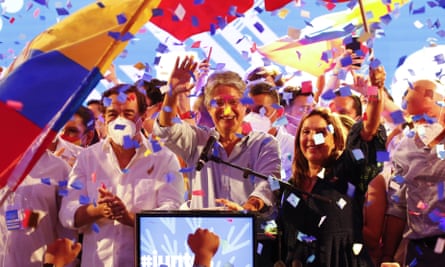A conservative businessman has unexpectedly won Ecuador’s presidential election as voters rejected the leftist movement started by the former president Rafael Correa more than a decade ago.
Preliminary results showed that Guillermo Lasso took 52% of the vote in the runoff following a campaign that pitted free-market economics against the social welfare plans of Andrés Arauz, an economist.
“We will work together from now on for true change,” Lasso wrote on Twitter. “Today we woke up in peace and with the certainty that better days are coming for everyone.”
Arauz, in contrast to his combative style on the campaign trail, graciously accepted defeat and promptly called Lasso to congratulate him.
In neighbouring Peru, voting on a crowded field of 18 candidates for the presidency was all but certain to result in a second round of ballots in June.
Voters in the two countries cast votes under strict public health measures because of the coronavirus pandemic, which has recently worsened in both countries, prompting the return of lockdowns and heightening concerns over their already battered economies. Peruvians also were electing a new Congress.
In Ecuador, Arauz was backed by Correa, a major force in the country despite a corruption conviction that sent him fleeing to Belgium beyond the reach of prosecutors.
“Correa’s negatives outweighed the expectation of a new, unknown candidate who had no career and who did not campaign very well,” said Grace M Jaramillo, an adjunct professor at the University of British Columbia. “He did not speak for all audiences … for the entire population, and he could not respond to human rights accusations of the Correista era.”
Correa governed from 2007 to 2017 and was an ally of Cuba’s Fidel Castro and Venezuela’s Hugo Chávez. He oversaw a period of economic growth driven by an oil boom and loans from China that allowed him to expand social programmes, build roads and schools and pursue other projects.

But Correa increasingly cracked down on opponents, the press and businesses during his latter term in office and feuded with Indigenous groups over development projects.
Lasso, 65, who takes office on 24 May, will have to find ways to kickstart the stalled economy, which is in a recession that many fear will worsen as lockdowns return because of a surge in Covid cases.
“I hope he keeps his promise of creating jobs, because seven in 10 Ecuadoreans want formal employment,” said Juan Pablo Hidalgo, 33, a neighbourhood activist in Guayaquil, Ecuador‘s largest city. “It’s a moment in which we should all be united.”
Ecuador had recorded more than 344,000 Covid cases and more than 17,200 deaths as of Sunday, according to data from Johns Hopkins University.
The new president’s main task will be to “depolarise the country”, Jaramillo said. “There will be no signs of governance if the new government does not reach out and generate a platform where agreements with the [National] Assembly are possible.”
In Peru, to avoid a June runoff a candidate would need more than 50% of the votes, and recent polls pointed to the leading candidate garnering only about 15% support.
The polls have had the centrist Yonhy Lescano as the frontrunner, followed by the centre-right George Forsyth, the conservative Rafael López Aliaga and Keiko Fujimori, the opposition leader and daughter of the polarising former president Alberto Fujimori.
Political chaos in Peru reached a new level in November when three men were president in a single week, as one was impeached by Congress over corruption allegations, and protests forced his successor to resign in favour of the third.
Claudia Navas, an analyst with Control Risks, said the fragmented election was the result of a political system that had 11 parties lacking ideological cohesiveness. She said Peruvians overall did not trust politicians, with corruption being a key driver of disillusionment.
Navas said the congressional elections would probably result in a splintered legislature, with no party holding a clear majority and political alliances remaining short-lived. She said the new Congress was likely to continue to exercise its impeachment authority to reinforce its influence and block any initiative that threatened its power.
“Regardless of who wins, we believe that the president is somewhat unlikely to complete his or her term in office because of the of the populist-type of stance of the Congress and the risk of political instability is likely to persist through the administration,” she said.
Peru has been hard hit by coronavirus, with more than 1.6m cases and more than 54,600 deaths as of Sunday.
